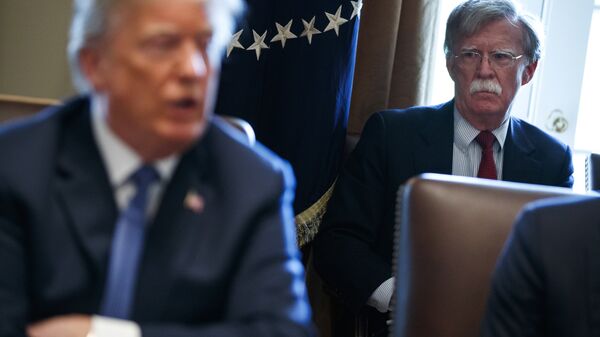Politico reported Wednesday afternoon that Bolton, who was fired by Trump last month, was scheduled for a House deposition on November 7, citing "a source familiar with the matter."
Other Trump subordinates, such as Vice President Mike Pence and Trump's personal counsel, Rudy Giuliani, have followed the president's lead in refusing to answer subpoenas issued by a bevy of House committees for documents and testimony concerning their impeachment probe. It's unclear if Bolton, who left the administration amid extensive disagreement on foreign policy issues with the president, will follow suit.
Charles Cooper, Bolton's lawyer, told NBC News later Wednesday that "Bolton is not willing to appear voluntarily," adding that he is standing "ready at all times to accept service of a subpoena on his behalf."
While until this point, depositions in the probe have been performed behind closed doors, House Democrats stand poised to introduce a new resolution on Thursday that will lay the groundwork for a new phase of the inquiry based on public hearings.
Reports have already surfaced that Bolton disagreed with Trump's push for Ukrainian President Volodymyr Zelenskyy to open an investigation of former US Vice President Joe Biden, about which the impeachment probe is centered.
Fiona Hill, Trump's former Russia and Eurasia adviser who left her post in late July, told representatives earlier this month that Bolton had told her he was "not part of whatever drug deal Rudy [Giuliani] and [White House Chief of Staff Mick] Mulvaney are cooking up," in reference to the Ukrainian Biden probe proposal.
An unnamed source told the Washington Post for a Friday story that Bolton had intervened with White House Trade Representative Robert Lighthizer in August to stop the restoration of Ukraine's trade privileges, arguing Trump wouldn't approve of the move. Whether or not Trump attempted some sort of "quid pro quo" deal with Ukraine regarding US aid is one of the central questions of the impeachment inquiry, which seeks to determine if Trump broke the law.
The formal inquiry began on September 24, following publication of a transcript of the July 25 Trump-Zelenskyy phone call as well as revelations that a hushed-up whistleblower report by a CIA official was about the call.


